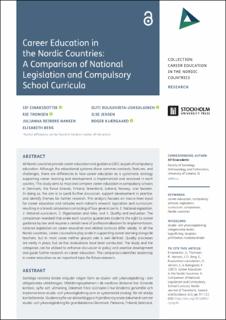| dc.contributor.author | Einarsdottir, Sif | |
| dc.contributor.author | Thomsen, Rie | |
| dc.contributor.author | Hansen, Julianna Deirdre | |
| dc.contributor.author | Berg, Elisabeth | |
| dc.contributor.author | Ruusuvirta-Uuksulainen, Outi | |
| dc.contributor.author | Jensen, Ilse | |
| dc.contributor.author | Kjærgård, Roger | |
| dc.date.accessioned | 2024-03-21T13:13:14Z | |
| dc.date.available | 2024-03-21T13:13:14Z | |
| dc.date.created | 2023-12-19T18:50:15Z | |
| dc.date.issued | 2023 | |
| dc.identifier.citation | Einarsdottir, S., Thomsen, R., Hansen, J. D., Berg, E., Ruusuvirta-Uuksulainen, O., Jensen, I., & Kjærgaard, R. (2023). Career Education in the Nordic Countries: A Comparison of National Legislation and Compulsory School Curricula. Nordic Journal of Transitions, Careers and Guidance, 4(1), 97–112. | en_US |
| dc.identifier.issn | 2003-8046 | |
| dc.identifier.uri | https://hdl.handle.net/11250/3123639 | |
| dc.description.abstract | All Nordic countries provide career education and guidance (CEG) as part of compulsory education. Although the educational systems share common contexts, features, and challenges, there are differences in how career education as a systematic strategy supporting career learning and development is implemented and accessed in each country. This study aims to map and compare career education in compulsory schools in Denmark, the Faroe Islands, Finland, Greenland, Iceland, Norway, and Sweden. In doing so, the aim is to spark further discussion, support development in practice, and identify themes for further research. The analysis focuses on macro-level input for career education and includes each nation’s relevant legislation and curriculum, resulting in a broad comparison consisting of four general parts: 1. National legislation, 2. National curriculum, 3. Organisation and roles, and 4. Quality and evaluation. The comparison revealed that while each country guarantees students the right to career guidance by law and requires a certain level of professionalisation for implementation, national legislation on career education and related curricula differ widely. In all the Nordic countries, career counsellors play a role in supporting career learning alongside teachers, but in most cases neither group’s role is well-defined. Quality processes are rarely in place, but ad hoc evaluations have been conducted. The study and the categories can be utilised to enhance discussion in policy and practice development and guide further research on career education. The comparison identifies leadership in career education as an important topic for future research. | en_US |
| dc.language.iso | eng | en_US |
| dc.rights | Navngivelse 4.0 Internasjonal | * |
| dc.rights.uri | http://creativecommons.org/licenses/by/4.0/deed.no | * |
| dc.title | Career Education in the Nordic Countries: A Comparison of National Legislation and Compulsory School Curricula | en_US |
| dc.type | Peer reviewed | en_US |
| dc.type | Journal article | en_US |
| dc.description.version | publishedVersion | en_US |
| dc.rights.holder | © 2023 The Author(s). | en_US |
| dc.source.pagenumber | 97-112 | en_US |
| dc.source.volume | 4 | en_US |
| dc.source.journal | Nordic Journal of Transitions, Careers and Guidance | en_US |
| dc.source.issue | 1 | en_US |
| dc.identifier.doi | https://doi.org/10.16993/njtcg.64 | |
| dc.identifier.cristin | 2215871 | |
| cristin.ispublished | true | |
| cristin.fulltext | original | |
| cristin.qualitycode | 1 | |

